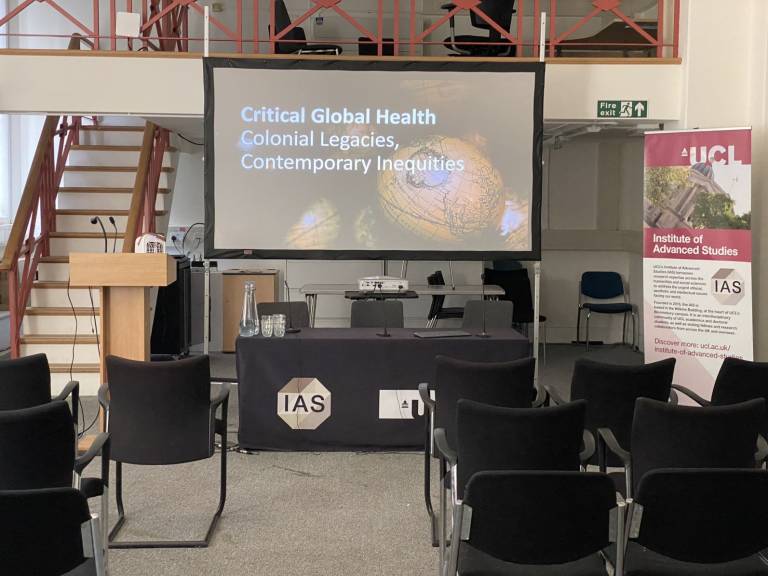An account of the June 2023 symposium on Critical Global Health and an opportunity for ECRs/PGRs to take a leadership role in a new Critical Global Health Early Career Network.

Since early 2022, an interdisciplinary group of scholars affiliated with the Grand Challenge of Global Health – including three members of the SHS Health, Mind and Society Steering Group - has been working to map and bring together scholars of Critical Global Health across UCL. Following an initial online roundtable and podcast series, we set out to organise an interdisciplinary hybrid symposium at the Institute for Advanced Studies: “Colonial Legacies, Contemporary Inequities: Critical Approaches to Global Health” (full schedule here).
In her opening remarks, Prof Sahra Gibbon (Anthropology) stressed the relevance of critical scholarship for understanding evolving health inequalities, which - far from disappearing - are in fact “becoming more starkly apparent and entrenched”. Catriona Gold (Geography) followed, thanking attendees for helping to make the event as inclusive as possible – for everyone, but especially for those at heightened risk from covid – concluding “we keep each other safe”
Our first speaker, Dr Chisomo Kalinga (Edinburgh) delivered a powerful keynote entitled “Africa and the critical health humanities: lessons in autonomy, sovereignty and voice”. Beginning with a short story by Doris Lessing (“No Witchcraft for Sale”), she provided a critical lens through which attendees might understand the perspectives and motivations of the indigenous people in the tale. She also offered reflections on her experience of building a career in critical global health, and affirmed the importance of creating covid-safe, inclusive spaces within the academy.
Our first ECR paper session centred around a core strand of critical global health thinking: the relationship between physical and social dimensions of health inequality. Presentations discussed extraction and embodied inequalities among indigenous Brazilians (Dr Maria Paula Prates, Anthropology); social dimensions of cholangiocarcinoma in Thailand (Filus Liu, Anthropology); health impacts of climate change on older people in China (Jinghan Li and Dan Liang, Geography); political economies of advertising to children (Srivatsan Rajagopalan and Maria Soraghan, Institute for Global Health); and finally, the implications of the World Bank’s digital initiatives for development (Nai Lee Kalema, The Bartlett).
In the second session, the first three presenters offered critical examinations of mental health and psychiatric diagnoses in various contexts, variously evaluating the utility of mental health rehabilitation practices in Morocco (Sophia El Ouazzani, Psychiatry and Institute for Global Health); problematising the Northern valorisation of ‘cultural healing’ in Southern contexts (Ananya Choyal, Anthropology); and outlining methods for incorporating cultural considerations into research on childhood sexual abuse (Shivangi Talwar, Psychiatry). Rosamund Greiner and Hattie Lowe (Institute for Global Health) closed the session with an account of their collaborative approach to reflexivity.
Our second keynote speaker, Dr Jean Segata (Federal University of Rio Grande do Sul), offered a sharp critique of contemporary agribusiness and its deleterious and unequal effects on human health. His talk - “Feeding the end of the world: unhealthy ecologies, precarious labor, and COVID-19 in the meat industry in Southern Brazil” - was a bracing account of the intersection of COVID-19, capitalism and industrial slaughter: describing, in short, how “the purpose of animal agribusiness is not to produce food, but to produce money and sickness” (an earlier version of Jean’s talk can be found here).
Dr Jennie Gamlin (Institute for Global Health) chaired our concluding roundtable, asking participants how we might engage with both the ‘coloniality of knowledge’ and the seeming ‘disencounter’ between critical global health and medical science perspectives. Prof Ed Fottrell (Institute for Global Health) framed his response around the increasingly prominent idea of ‘implementation science’: e.g. who are studies like ‘global maternal mortality’ etc. actually serving? Dr Jean Segata called for researchers to explicitly address speciesism and question the ‘pathogen-centrism’ of research; building on this, Prof Sahra Gibbon drew attention to the need to think about planetary health and more than human sociality and ecological entanglements. Dr Chisomo Kalinga reflected further on the scope of collaboration in critical global health, while Prof Sushrut Jadhav (Psychiatry) outlined the tensions inherent in asking psychiatrists in the Global South to give up colonial vocabulary – potentially harming their careers by doing so - as an uneven impact of what he termed the ‘decolonisation bandwagon
Prof Megan Vaughan (Institute of Advanced Studies) and Dr James Paskins (Grand Challenges) offered closing comments, thanking attendees for their contributions and affirming our commitment to continuing these conversations, before we moved to our closing reception.
A note on covid and inclusivity. We used some simple, inexpensive precautions to make the space safer for all. First, we provided clear instructions that participants should not attend in-person if unwell. Second - because covid primarily spreads by air - participants were provided with a choice of masks, windows were opened and fans were used to assist with ventilation. The lunch and reception were held outdoors on the Quad, with ample seating and shade for all attendees. Finally, the event was fully hybrid: three of our speakers delivered their contributions via Zoom, and many attendees chose to join virtually. This had the additional benefit of making the symposium more accessible to wider audiences both within and beyond UCL. We hope that sharing our experience here will be useful to others considering how to make their events inclusive for everyone, including disabled and ‘clinically vulnerable’ colleagues.
This symposium was organised by the GCGH Critical Global Health Working Group: Catriona Gold (Geography), Prof Sahra Gibbon (Anthropology), Prof Megan Vaughan (Institute of Advanced Studies), Dr Jennie Gamlin (Institute for Global Health), with support from Dr James Paskins (Grand Challenges). Funding was provided by Grand Challenges, the Institute of Advanced Studies Octagon Fund, and Social and Historical Sciences. Readers can find out more about the broader Critical Global Health initiative here.
Finally: in the interest of continuing to facilitate and promote PGR/ECR scholarship and interdisciplinary connections at UCL, we are seeking ECR/PGR scholars to assume leadership of a new, interdisciplinary ECR network in Critical Global Health (application deadline Sept 29).
Image: James Paskins
 Close
Close


